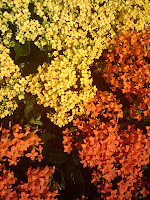 For years, my academic efforts have brought me along a good many true and right paths. I was always surprised when the trail kept spreading out before me. There were a few contorted twists and switchbacks here and there, but always moving upward, forward. And always a delight for the eyes. Words spilling out of books, I stood under them and tried to catch what I could of the blooms sailing down. Beneath my feet, ideas as old as dirt from which new thoughts poked up from deep, unseen places, just showing their tips above ground in the early season. I tilled till I ached, I took it all in. Work and pleasure.
For years, my academic efforts have brought me along a good many true and right paths. I was always surprised when the trail kept spreading out before me. There were a few contorted twists and switchbacks here and there, but always moving upward, forward. And always a delight for the eyes. Words spilling out of books, I stood under them and tried to catch what I could of the blooms sailing down. Beneath my feet, ideas as old as dirt from which new thoughts poked up from deep, unseen places, just showing their tips above ground in the early season. I tilled till I ached, I took it all in. Work and pleasure. Last weekend, a sabbath from the toil. The impudent spontaneity of a Sunday on the verge of warm kept us out after an afternoon concert. We whisked through cold blue shadows between tall buildings until we reached golden beams and lingered there, languorous. No flowers. Concrete and rusty pine from December, placed at regular intervals along the Mall. "Dry the pool, dry concrete, brown edged." I pick up a line or two and let my mind wander to gardens. Our feet follow, through the brass-handled
Last weekend, a sabbath from the toil. The impudent spontaneity of a Sunday on the verge of warm kept us out after an afternoon concert. We whisked through cold blue shadows between tall buildings until we reached golden beams and lingered there, languorous. No flowers. Concrete and rusty pine from December, placed at regular intervals along the Mall. "Dry the pool, dry concrete, brown edged." I pick up a line or two and let my mind wander to gardens. Our feet follow, through the brass-handled doors, up the escalator seven times, and we find ourselves engulfed by buzzing crowds, the heady scent of greenhouses, and bursts of impossible color. Thank you, Macy's. Even if it is "the spring time, but not in time's covenant." Not in Minnesota, at least.
doors, up the escalator seven times, and we find ourselves engulfed by buzzing crowds, the heady scent of greenhouses, and bursts of impossible color. Thank you, Macy's. Even if it is "the spring time, but not in time's covenant." Not in Minnesota, at least. I am not a botanist, or even a well-informed amateur gardener, but it seems as if the best sort of bloom ought to also be a harbinger of fruit. When blossoms come to the end of their ephemeral life, shouldn't they go through that painful-seeming process of turning inside-out, transforming themselves into bread for the eater and seed for the sower? Woe to the tree that does not bear fruit.
I am not a botanist, or even a well-informed amateur gardener, but it seems as if the best sort of bloom ought to also be a harbinger of fruit. When blossoms come to the end of their ephemeral life, shouldn't they go through that painful-seeming process of turning inside-out, transforming themselves into bread for the eater and seed for the sower? Woe to the tree that does not bear fruit.And so my thoughts run for these long seasons of preparation - paths of beauty that have been unto themselves, many blooms holding out for transformation into something one could eat. We long for at least a partial fulfillment of the creation mandate: "Be fruitful and multiply." To reverse the curse of the ground. While we groan with Adam and Eve, we have a better hope. "Let the favor of the Lord our God be upon us; And confirm for us the work of our hands; Yes, confirm the work of our hands."





